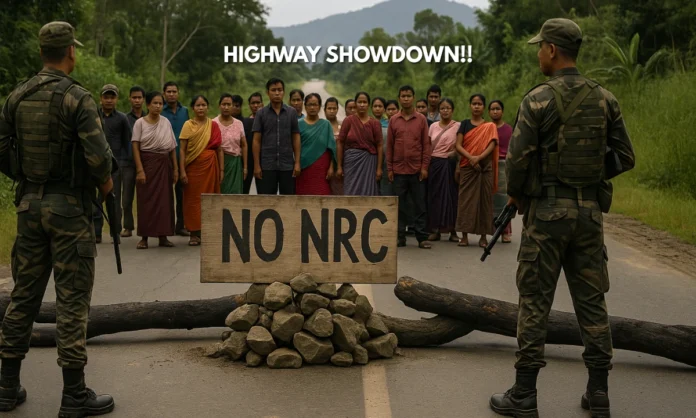Key Highlights:
- Kuki-Zo Council contradicts Centre’s announcement about National Highway-2 reopening, maintaining buffer zone restrictions
- Government’s September 4 statement about highway reopening faces immediate opposition from tribal organizations
- Ongoing ethnic violence since May 2023 has claimed 258 lives and displaced 60,000 people across Manipur
Initial Context
The Kuki-Zo Council’s denial of National Highway-2 reopening has exposed deep contradictions between the Centre’s public announcements and ground realities in violence-torn Manipur. The tribal organization’s firm rejection of the Ministry of Home Affairs’ September 4 statement reveals the complex dynamics of buffer zone politics that have emerged following ethnic violence between Meitei and Kuki-Zo communities.
The disagreement centers on the interpretation of agreements reached during meetings between Kuki-Zo Council representatives and Home Ministry officials in New Delhi, highlighting the fragile nature of peace negotiations in the ethnically divided state. The controversy has created significant confusion about the actual status of the vital highway that connects Imphal to Dimapur, serving as a crucial lifeline for essential supplies and commuter movement.
Two days after PM Modi concluded his Manipur visit, the KZC,which signed an agreement on Sep 4 with the MHA for the reopening of NH-2, rescinded the pact, says no reopening till a settlement is reached between Kuki-Zo-Meitei community. I ✍️ https://t.co/0vNJ4xirME
— Vijaita Singh (@vijaita) September 16, 2025
Political Organizations Challenge Centre’s Authority
The Thadou Inpi Manipur emerged as a key voice challenging the Kuki-Zo Council’s position, asserting that National Highway-2 belongs to the central government and that its obstruction violates fundamental rights. TIM’s statement emphasized that highway blockades constitute serious violations of constitutional principles, particularly the right to free movement guaranteed under Article 19 of the Indian Constitution.
- Thadou community organizations accused “Kuki supremacists” of attempting to forcibly subsume distinct tribal identities under broader Kuki nomenclature
- TIM urged community members to refrain from mob mobilization and highway blockades while respecting constitutional principles
- The organization called for cooperation with law enforcement agencies to ensure uninterrupted functioning of NH-2 for all communities
- Tensions between Thadou and other Kuki groups reflect deeper intra-tribal political dynamics affecting peace negotiations
Meitei organizations, including the Meitei Heritage Society, characterized the situation as undermining state authority, arguing that fundamental rights are being dictated by insurgent groups rather than government enforcement. The MHS described the Home Ministry’s claims as misleading, particularly when contradicted by official statements from Chin-Kuki insurgent groups operating under Suspension of Operations agreements. The Kuki-Zo Council spokesperson Ginza Vualzong’s residence was targeted in recent attacks, highlighting escalating tensions surrounding the highway dispute.
Buffer Zone Dynamics and Security Concerns
The Kuki-Zo Council’s insistence on maintaining buffer zones reflects the deep-seated mistrust between communities following the ethnic violence that erupted in May 2023. According to government statistics, the conflict has resulted in 258 deaths and displacement of 60,000 people, with 4,786 houses burned and 386 religious structures vandalized.
The Kuki-Zo Council’s Monday statement warned that buffer zone violations would lead to “serious consequences and further deterioration of peace and security,” indicating the fragile nature of current arrangements. Security experts note that these unofficial buffer zones, manned by central security forces, have become critical demarcation lines preventing further escalation of violence.
- Buffer zones established at Imphal-Kangpokpi border prevent cross-community movement
- Central security forces deployment includes 126 army columns and 62 paramilitary companies
- Unofficial estimates suggest over 10,000 army, paramilitary and Central Armed Police Forces deployed across Manipur
- Economic impact of blockades estimated at Rs. 2.5 billion daily losses according to unofficial calculations
The contradiction between the Centre’s announcement and ground realities highlights the complex challenge of implementing peace agreements in ethnically divided territories where trust deficits persist despite high-level negotiations. The Kuki-Zo Council maintains that no settlement has been reached between warring communities, necessitating continued buffer zone enforcement.
Suspension of Operations Agreement and Insurgent Groups
The renewal of the Suspension of Operations agreement with 24 Kuki-Zo insurgent groups under the Kuki National Organisation and United People’s Front represents a significant diplomatic development. The tripartite agreement between the Centre, Manipur government, and insurgent organizations includes provisions for camp reduction from 14 to 10 locations and stringent physical verification processes.
Key provisions of the renewed SoO agreement include relocation of weapons to nearest CRPF/BSF camps and removal of foreign nationals from cadre lists through verification processes. The Joint Monitoring Group will closely monitor enforcement of ground rules, with violations potentially leading to complete review of the suspension agreement. The Kuki-Zo Council clarified its September 4 appeal was specifically confined to the Kangpokpi stretch and aimed at encouraging cooperation with central security forces.
- Total SoO cadre strength stands at 2,181 personnel across designated camps as of February 2024
- Insurgent groups agreed to avoid activities threatening Manipur’s territorial integrity
- Physical reverification process mandated for all SoO cadres under new ground rules
- Extension period set for one year from signing date with possibility of review based on compliance
The complexity of managing multiple insurgent groups while maintaining ceasefire arrangements demonstrates the intricate nature of conflict resolution in Northeast India’s ethnic landscape. The Kuki-Zo Council emphasized that their cooperation request to Kangpokpi residents should not be misinterpreted as endorsement of unrestricted movement across buffer zones.
Closing Assessment
The contradiction between the Centre’s public statements and the Kuki-Zo Council’s denial reveals the challenging reality of implementing peace agreements in ethnically divided Manipur. Despite high-level negotiations and renewed Suspension of Operations agreements, fundamental trust deficits between communities continue to impede genuine reconciliation efforts.
The economic implications of ongoing highway disruptions, estimated at billions in daily losses, underscore the urgent need for sustainable solutions that address both security concerns and constitutional rights. The dispute over National Highway-2 represents more than transportation access—it reflects deeper questions about state authority, community autonomy, and the delicate balance required for lasting peace in India’s volatile northeastern frontier. The Kuki-Zo Council’s unwavering stance on buffer zone maintenance demonstrates the complex challenge facing policymakers in resolving ethnic conflicts through negotiated settlements.


